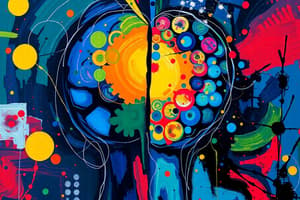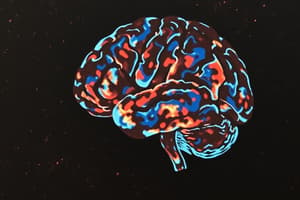Podcast
Questions and Answers
Genetic influences can only determine physical characteristics and not behavioral predispositions.
Genetic influences can only determine physical characteristics and not behavioral predispositions.
False (B)
Imbalances in neurotransmitter levels have no impact on cognitive functioning.
Imbalances in neurotransmitter levels have no impact on cognitive functioning.
False (B)
Hormone levels do not directly affect mood and behavior.
Hormone levels do not directly affect mood and behavior.
False (B)
Accumulated knowledge does not contribute to the formation of beliefs, values, and attitudes.
Accumulated knowledge does not contribute to the formation of beliefs, values, and attitudes.
Learning and memory are non-material elements of the mind.
Learning and memory are non-material elements of the mind.
Neurotransmitters play no role in transmitting signals within the nervous system.
Neurotransmitters play no role in transmitting signals within the nervous system.
Emotions, being non-material elements of the mind, have no significant impact on behavior.
Emotions, being non-material elements of the mind, have no significant impact on behavior.
Conscious awareness and self-awareness are part of the non-material mind.
Conscious awareness and self-awareness are part of the non-material mind.
The interplay between consciousness and the physical body does not raise questions or provide insights into human nature.
The interplay between consciousness and the physical body does not raise questions or provide insights into human nature.
Emotions can act as a cognitive shortcut and facilitate faster decision making.
Emotions can act as a cognitive shortcut and facilitate faster decision making.
The level of consciousness has no impact on a person's ability to make rational decisions.
The level of consciousness has no impact on a person's ability to make rational decisions.
Self-awareness does not play a role in shaping identity and social interactions.
Self-awareness does not play a role in shaping identity and social interactions.
Flashcards are hidden until you start studying
Study Notes
Behavior as a Function of a Non-Material Mind and a Material Body
The question of how behavior is influenced by both a non-material mind and a material body has long been a subject of fascination in various fields, including psychology, neuroscience, philosophy, and more. This interplay between the intangible aspects of our consciousness and the tangible manifestations of our physical being raises numerous questions and provides intriguing insights into human nature and existence.
The Non-Material Mind
Consciousness and Awareness
The non-material mind encompasses concepts such as conscious awareness and self-awareness. These facets can influence behavior through their impact on decision making, emotional responses, memory recall, perception, and other cognitive processes. For example, a person's level of consciousness can affect their ability to make rational decisions, leading them to engage in impulsive or irrational acts. Similarly, the nature of one's self-awareness can play a role in shaping identity, social interactions, and overall behavior.
Emotion and Thinking
Emotions, which are often associated with non-material elements of the mind, also significantly impact behavior. They can drive actions, shape perceptions, and influence thought patterns. Research suggests that emotions can act as a cognitive shortcut, facilitating faster processing and decision making under certain circumstances. Thus, understanding the relationship between emotions and thinking can offer valuable insights into the motivation behind human behavior.
Learning and Memory
Non-material elements of the mind, such as learning and memory, also contribute to behaviors. Our experiences and accumulated knowledge form the basis of our beliefs, values, and attitudes, ultimately influencing the choices we make and the actions we take. For instance, previous experiences may lead individuals to exhibit fearful behaviors when confronted with similar stimuli. Furthermore, memory can also reinforce learned behaviors, either reinforcing positive habits or perpetuating negative ones.
The Material Body
Genetics and Biology
Our material bodies, made up of cells, tissues, organs, and systems, are governed by genetics and biological processes. Genetic influences can determine predispositions towards certain behaviors, conditions, and traits, while biological factors like hormone levels can directly impact mood, cognition, and behavior. Understanding these physiological mechanisms can help researchers identify potential targets for therapeutic intervention aimed at modifying behavioral outcomes.
Neurotransmitters and Brain Structure
Neurotransmitters are chemical messengers responsible for transmitting signals within the nervous system. Imbalances in neurotransmitter levels have been linked to a range of psychiatric disorders characterized by abnormalities in emotion regulation, impulse control, and cognitive functioning. Additionally, variations in brain structure can influence the production and distribution of neurotransmitters, thereby affecting behavioral outputs. By studying the relationships between neurotransmitters, brain structure, and behavior, we gain knowledge about the underlying mechanisms driving particular behaviors.
Environment
Environmental factors, including social context, culture, and life events, also exert significant influence over behavior through their impact on cognition, emotion, and physiological processes. For example, childhood trauma may contribute to increased risk of mental health issues later in life due to lasting changes in neural architecture. Therefore, understanding how environmental factors interact with the material body can shed light on the multifaceted nature of behavior.
In conclusion, understanding the complex interplay between the non-material mind and the material body is essential for gaining a comprehensive perspective on human behavior. By considering both the intangible aspects of consciousness and the tangible components of our biology, researchers can develop a more nuanced understanding of the factors that drive our thoughts, emotions, and actions. This knowledge can inform interventions designed to address problematic behaviors, foster resilience, and promote wellbeing.
Studying That Suits You
Use AI to generate personalized quizzes and flashcards to suit your learning preferences.




